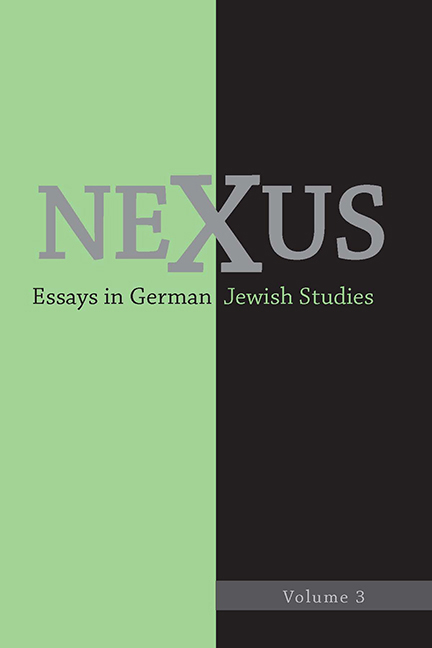Book contents
- Frontmatter
- Dedication
- Contents
- Acknowledgements
- Introduction
- “Ein weites Feld”: Ein Wort zu deutsch-jüdischen Studien anläβlich der Verleihung des ersten Egon Schwarz Prize for the Best Essay in German Jewish Studies
- “An Open Field”: A Word about German Jewish Studies on the Occasion of the Presentation of the first Egon Schwarz Prize for the Best Essay in German Jewish Studies
- Laudatio for Abigail Gillman's Prize-Winning Nexus Essay: “Martin Buber's Message to Postwar Germany”
- Heinrich Heine in Modern German History, by an Eyewitness
- Jeffrey Sammons, Heine, and Me: Some Autobiographical Reflections
- Heine's Disparate Legacies: A Response to Jeffrey Sammons
- My Debt to Heine and Sammons
- Die letzten Tage der Menschheit as a German-Jewish Tragicomedy, and the Challenge to Translators
- Edward Timms's “Die letzten Tage der Menschheit as a German-Jewish Tragicomedy and the Challenge to Translators”: A Response
- Kraus the Mouse? Kafka's Late Reading of Die Fackel and the Vagaries of Literary History
- The Parable of the Rings: Sigmund Freud Reads Lessing
- The Poetics of the Polis: Remarks on the Latency of the Literary in Hannah Arendt's Concept of Public Space
- The Marrano in Modernity: The Case of Karl Gutzkow
- German Jews Dogged by Destiny: Werewolves and Other Were-Canids in the Works of Heinrich Heine and Curt Siodmak
- Authenticity, Distance, and the East German Volksstück: Yiddish in Thomas Christoph Harlan's Ich Selbst und Kein Engel
The Parable of the Rings: Sigmund Freud Reads Lessing
Published online by Cambridge University Press: 11 May 2017
- Frontmatter
- Dedication
- Contents
- Acknowledgements
- Introduction
- “Ein weites Feld”: Ein Wort zu deutsch-jüdischen Studien anläβlich der Verleihung des ersten Egon Schwarz Prize for the Best Essay in German Jewish Studies
- “An Open Field”: A Word about German Jewish Studies on the Occasion of the Presentation of the first Egon Schwarz Prize for the Best Essay in German Jewish Studies
- Laudatio for Abigail Gillman's Prize-Winning Nexus Essay: “Martin Buber's Message to Postwar Germany”
- Heinrich Heine in Modern German History, by an Eyewitness
- Jeffrey Sammons, Heine, and Me: Some Autobiographical Reflections
- Heine's Disparate Legacies: A Response to Jeffrey Sammons
- My Debt to Heine and Sammons
- Die letzten Tage der Menschheit as a German-Jewish Tragicomedy, and the Challenge to Translators
- Edward Timms's “Die letzten Tage der Menschheit as a German-Jewish Tragicomedy and the Challenge to Translators”: A Response
- Kraus the Mouse? Kafka's Late Reading of Die Fackel and the Vagaries of Literary History
- The Parable of the Rings: Sigmund Freud Reads Lessing
- The Poetics of the Polis: Remarks on the Latency of the Literary in Hannah Arendt's Concept of Public Space
- The Marrano in Modernity: The Case of Karl Gutzkow
- German Jews Dogged by Destiny: Werewolves and Other Were-Canids in the Works of Heinrich Heine and Curt Siodmak
- Authenticity, Distance, and the East German Volksstück: Yiddish in Thomas Christoph Harlan's Ich Selbst und Kein Engel
Summary
Sigmund Freud knew Gotthold Ephraim Lessing's Nathan the Wise well. In this drama, the Sultan of Jerusalem asks Nathan, a Jewish merchant, to demonstrate his wisdom by telling him which of the three religions— Judaism, Christianity, Islam—is true. In return, Nathan tells the parable of the three rings. This essay focuses on Freud's reception of Lessing's parable by analyzing three instances: Freud's secret engagement with Martha Bernays, his shaping of the psychoanalytic institution, and his concept of Judaism and the Jewish people.
NATHAN THE WISE (1779) is perhaps the most famous of Gotthold Ephraim Lessing's works, and it certainly belongs to the classical canon of German literature. Lessing described the play not as a drama, but as a “dramatic poem,” and it is best known for a parable. This parable is inserted into a conversation between Nathan, a Jewish merchant, and the Sultan of Jerusalem. The Sultan calls for the trader, compliments Nathan on his wisdom, and asks him a question that is both honest and provocative: Which of the three major religions is the true one, Judaism, Christianity, or Islam?
Only a decade earlier, Lessing's friend, the Jewish philosopher Moses Mendelssohn, was urged by the Swiss minister Johann Caspar Lavater to confirm that Christianity was the true and superior faith, and to convert. Nathan the Wise in turn is set at a time of religious strife, during the Third Crusade, and here, a third religion enters the discussion. But the Sultan does not want Nathan to declare Islam to be true, nor to challenge him to conversation. He simply asks a question. In response, Nathan offers a lesson in diplomacy. He does not choose among the three religions, he does not decide or put them into a hierarchical order. Nathan tells a story instead.
Nathan's story is the parable of the three rings, and it is easily summarized. According to a family tradition, a father was supposed to pass on an old ring to the next generation before dying; he was to give it to the son whom he loved best.
- Type
- Chapter
- Information
- Nexus 3Essays in German Jewish Studies, pp. 97 - 112Publisher: Boydell & BrewerPrint publication year: 2017

